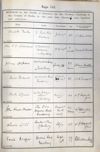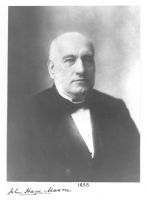|
|
JOHN HAWE MASON
DEATH OF MR. J.H. MASON
A NONOGENARIAN TOWNSMAN
THE “G.O.M.” OF LOCAL METHODISM
The death of Mr. John Hawe Mason, J.P., which occurred at his residence The Firs, Oxford-road , on Tuesday morning, was not altogether unexpected, for he had reached the great age of 90 and, although he had rallied in wonderful manner on former occasions, it was understood that this last illness was of a serious character from which recovery could scarcely be expected. The end was peaceful, Mr Mason passing away in his sleep.
To many of the younger generation the name of John Hawe Mason is little more than historical. He had outlived nearly all his contemporaries, two or three only being left, like Thomas Fidler and Charles Webb, who were associated with him in former years. The late Mr. Mason was born at Bilston, near Wolverhampton in 1817, two years after Waterloo. His father was the Rev. John Mason, who for many years held the important office of Book Steward in the Wesleyan Methodist Connexion. In 1840 young Mason came to Newbury, travelling by coach, two Newbury firms having advertised for an assistant. He entered the service of Mr. Killick, who was then head of a thriving grocery establishment in the Market-place. The new assistant proved a capable man, and quickly rose to the position of manager, and eventually partner. Thanks to Mr. Mason's management the business developed into a big concern, and later he took his two brothers, Philip and Henry, into partnership. The former went to Swindon, and then to New Zealand, and the latter (Mr Henry Mason) for a considerable time carried on business in Bartholomew-street. Mr. Mason afterwards took into partnership his son, Mr. John Mason, and the style of the firm became “Mason and Son,” as at present.
Though having many calls on his time as a business man, Mr. Mason took an active share in the public life of the borough, and his administrative capacity was much valued in many directions. He was a member of the Town Council for some years, and was Mayor of Newbury in 1856, the memorable year of the celebration of peace after the Russian War. As Mayor he entered into the arrangements with energy and enthusiasm, and largely owing to his admirable supervision, the celebration was a conspicuous success., the like of which has never been excelled in subsequent local demonstrations. Dinner was provided in the streets for all who chose to partake, and it was altogether a day, the memory of which is recalled by the older generation as one of the most remarkable in their lives. Mr. Mason became an Alderman and was appointed on the Commission of of the Peace for the Borough, probably in recognition of his patriotic service during his year of office. Mr. Mason was thus the “Father” of the Newbury Bench, and until recent years, when increasing years and his infirmity compelled a retirement from public life, he regularly discharged the duties of the magistracy, his judicial sagacity and clear judgment eminently fitting him for the post.
Mr Mason was actively associated with many of the business undertakings of the borough. He was a director and chairman of the Newbury Gas Company, and was actively concerned also with the Newbury Cemetery Company. He was a governor of St Bartholomew's Grammar School, and for a long time chairman of the Trustees of Municipal Charities, and to his energy and foresight the present Grammar School buildings are largely due. On the formation of the County Councils, Mr. Mason was a candidate for the representation of the north ward for the borough, but was unsuccessful by a few votes in securing election. However, the newly formed body paid a tribute to his worth by electing him as an alderman, in which capacity he rendered the town and county valuable service, his business ability being recognised by appointment on the Finance Committee, and his opinion and advice always carried much weight with his fellow members.
Member of an old Methodist family, Mr Mason was throughout his life, devoted to the interests of the Wesleyan body, in which he was regarded as a veritable “Mentor”.....
JOHN HAWE MASON
CONTINUED AN APPRECIATIVE ADDRESS
The address delivered by the Rev. E.P. Lowry was as follows. We are met top ay our last tribute of respect to one of the oldest and most honoured citizens of this ancient borough; and we rest assured that in this respect all classes of the community are in fullest possible accord with us. It is so long since Mr. Mason came to Newbury that few remain who now remember his coming. For over sixty years he took an active part in the business development of the town, and in all that pertained to the municipal, magisterial and philanthropic life he proved himself to be notably judicious, large minded and alert. Through all the changing years unchanging and unchallenged, he maintained his high repute, and by his habits of life even more than by his exceptionally great age, he grew venerable in the eyes of all. "Not slothful in business, fervent in spirit, serving the Lord" is an Apostolic saying that aptly sums up his whole career; and in a career so prolonged, high pricipled and prosperous, our young men may well find a potent incentive to pursue whatsoever things are pure and lovely and of good report.
Mr Mason, as you are all well aware, was the child of a Methodist Manse, and in more sense than one he became a true son of his sainted sire who entered the Wesleyan Ministry in 1811, and "fell asleep" in 1864. The oldest son f his father and the inheritor of his name, he greatly resembled him, not only in the length of days to which he attained but also in the marvellously prolonged vigour of his mind and body. The Rev. IJohn Mason passed away in the 83' year of his age, and the 53rd of his ministry, but the very day before his death he attended as usual to his various official duties and never became what in Methodism is called a supernumerary minister. Our now departed friend, Mr. Mason, of Newbury, at a yet riper age, was often found at his accustomed place of business; and when over 90 he was more than once seen reading his much-loved Methodist Magazine without the aid of glasses. Among the rewards of godliness it is written "With long life will I satisfy him and show him my salvation" The most notable event at the recent synod of the Oxford District, held in this very sanctuary, was the inspiring presence of Mr. Mason, and at dates yet later he repeatedly joined in Sunday morning worship within these walls. He was an exemplary lover of the Sabbath, and of the Sanctuary, and of all good men In him bigotry found no place; but, while in fullest sympathy with every good word and work he naturally bent his best energies to promote the prosperity of "the People called Methodists." among whom it was his privilege to be born, and among whom also it was his privilege to die.
Our friend further inherited his fathers' broad outlook on the world of christian endeavour. For some years the Rev. John Mason was one of the Secretaries of the Wesleyan Foreign Missionary Society, then as now one of the world's vastest agencies for the evangelization of the world...
Two further sheets complete the appreciation.... |








